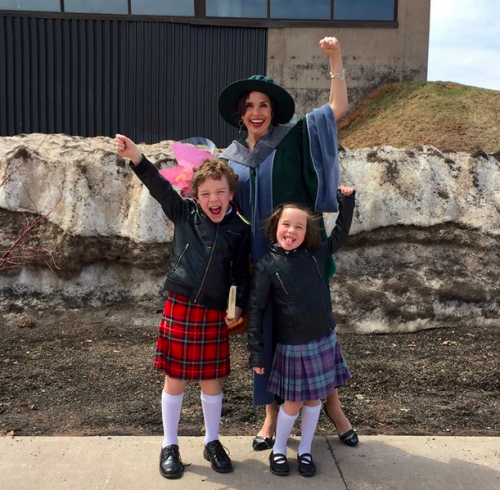So. Flanked by my children, who have shared their childhoods with the gestation of my Ph.D – a rather demanding sibling – I trotted across the UPEI stage Saturday and had this fancy hat bestowed upon me.
I am now either a right official Ph.D or Head of Gryffindor, one or the other. Either way, it was officially my mother’s very Best Day Ever.
With the end of a Ph.D comes one question – “what’s next?”
It’s an entirely reasonable and utterly terrible inquiry. In spite of increasingly-regular calls for changes, the long road of the Ph.D tends to veer to the straight & narrow production and acculturation of scholars to a profession that, frankly, has little room for them. Not all Ph.Ds want a tenure track position within the academy, certainly. But those that do face pretty grim odds…and have for some time. And while work in industry may be a far more lucrative option for some, opportunities vary drastically depending on discipline and geographic location and mobility. For those of us based in small, isolated, single-university towns with two young dependents and absolutely zero industry, “what’s next?” tends to be a rather painful confrontation with every Life Choice we’ve ever made.
Unless we get lucky.
I am, for the moment, lucky. I have an ongoing half-time Coordinator’s position at my university, and last week, I began a half-time post-doc with one of the people I like and respect most in my field, George Veletsianos, Canada Research Chair at Royal Roads University. I get to do the post-doc from here in Charlottetown. It’s the kind of research I do best. And so I count myself extraordinarily lucky, even while in the same breath I note that two half-time jobs does not a pension make and Dave & I have big decisions to make in the coming year. We are entertaining possibilities. But for the moment, I get to do good work with people I have great regard for, and I have An Answer to the question, “What’s next?” So glory be.
But there is a safety and security in the public position of “graduate student” that disappears once you get the funny hat. Even if the grad student label is pretty infantilizing for mid-career scholars, it’s still a form of protection against the assumption that you oughtta have a full-time academic job, if you’re any good. Once that student status is removed, you’re left standing naked at the precarious and contingent intersection of contemporary academic employment and the narratives of meritocracy that still fuel a great deal of graduate training. In a prestige economy, it can be risky to acknowledge your lack of prestige. Or your financial insecurity, or your hunger, or your part-time job at Starbucks/Walmart/ that pays the bills.
This is one of the positions that George and I want to explore in our first research project together. It’s a study of disclosure, care, and vulnerability in networked scholarship – an examination of the effects of sharing challenges online.
This is where you come in, dear readers.
We are speaking to people in higher ed about personal and professional disclosures they’ve made within social media networks, and the vulnerabilities and the expressions of care that have resulted, as well as what those experiences have meant for them as individuals and scholars. We have begun by looking at more personal disclosures – physical and mental health challenges, personal losses and life adjustments, identity factors. But my own ruminations on what is speakable online have left me curious about whether it may actually be riskier for scholars to talk about their professional difficulties than their personal ones, in identity spaces as public and traceable and searchable as social media platforms.
So we’re wondering…want to be involved? :)
Our formal invitation is below. The link to the consent form is in paragraph 5…if this research speaks to your experiences in any way, we encourage you to check out the link. Your voice is welcome, and appreciated.
***
We are inviting PhD students/candidates and academics to participate in a research study that we are conducting entitled “Academics’ use of social media: care and vulnerability.”
While the research community has studied the use of social media for teaching/research, we don’t know much about how these technologies are used by academics to share the challenges they face, express their vulnerabilities, and experience care online.
If you have disclosed a personal OR professional challenge that you have faced on social media (e.g. blogged about: being denied tenure, a dissertation committee conflict, or underemployment or adjunct challenges), we invite you to participate in this study.
We believe that these experiences are significant to share and discuss and we would love the opportunity to interview you to learn and write about your experiences.
If you are interested in participating in this study, please visit the following page to read the consent form that provides more details about this project: http://survey.royalroads.ca/index.php?sid=44151
We understand that this topic is very personal and discussing it with us may be difficult. If you have any questions or concerns regarding this study, please don’t hesitate to contact us. We would love to talk to you more about it.
Yours,
George & Bonnie
Dr. George Veletsianos
Canada Research Chair and Associate Professor
Royal Roads University
Dr. Bonnie Stewart
Post-Doctoral Fellow
Royal Roads University/University of Prince Edward Island
